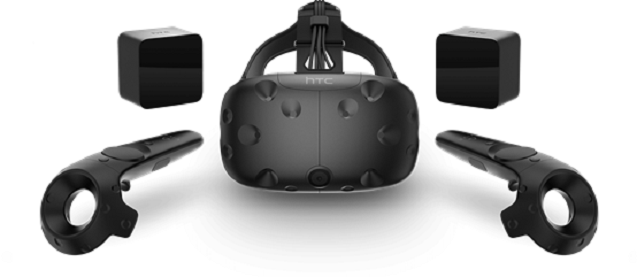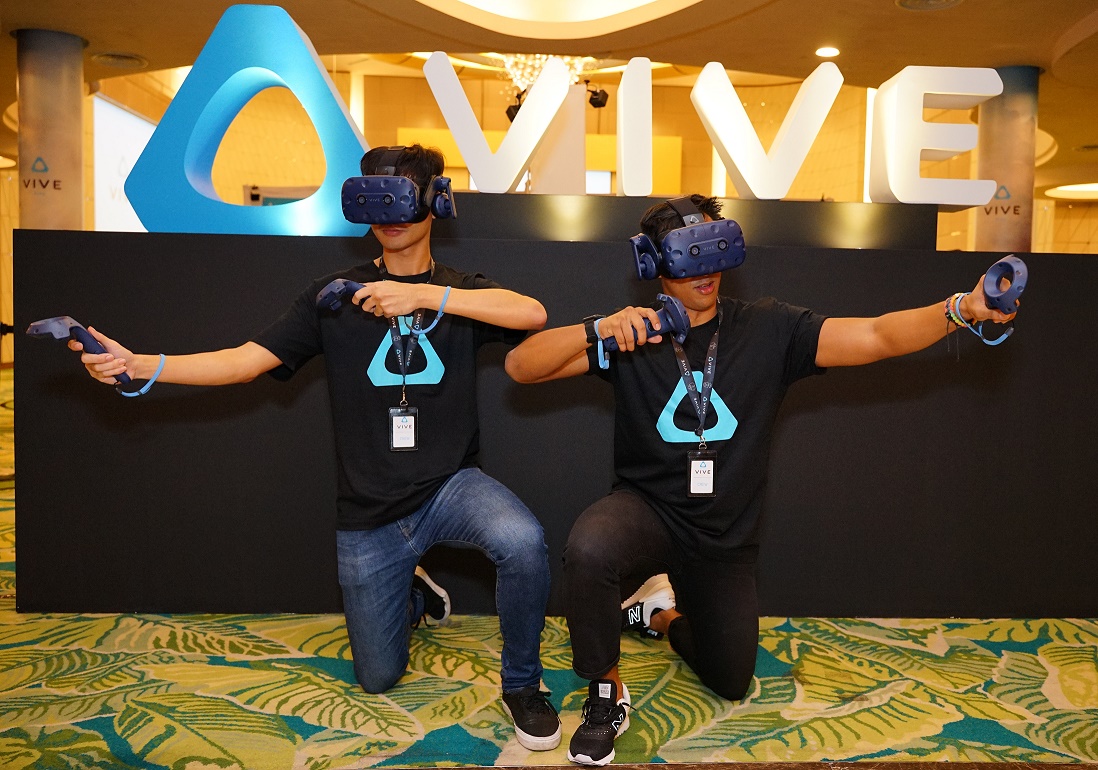HTC focuses on VR in hopes of reviving fortunes
By Edwin Yapp November 1, 2018
- Pivots towards VR software, content development as diversification
- To push VR headsets beyond gaming into industry segments
HTC Corp has launched what it claims to be the most advanced virtual reality headset in the market – the HTC VIVE Pro Starter Kit and the VIVE Consumer Edition – as it continues to divest away from being a purely global smartphone player.
Speaking at the launch in Kuala Lumpur on Oct 31, director for APAC sales for HTC Mike Chi (pic, above) said the company believes that the streamlined HTC, after having jettisoned a large part of its smartphone-making talent to Google earlier this year, is focused much more on just merely being a hardware player.
“Building hardware alone is not enough and not sustainable, and it doesn’t change lives,” Chi declared during his keynote at the launch. “We are building more than just VR headsets, we are building an ecosystem around VR that we believe will change lives.”
Chi said that VIVE is HTC’s line of hardware for VR while complementing this business is VIVEPORT, and app store for VR applications and content; VIVE studio, a studio for VR content; and VIVE X, a US$100 million accelerator fund for investing in VR-related startups.
Chi noted that this strategic shift means that HTC is no longer purely a hardware player and it’s banking on VR to be the next big thing after the PC and smartphone revolution in the 1980s and last decade respectively.
“We believe the future of VR is huge,” Chi said. “VR is going beyond just games. There are commercial applications that are taking advantage of what it can do,” he stressed, adding the car makers such as BMW Group are using its VR headsets to redefine how cars are designed, bought and sold.
At the launch of the new devices, HTC together with its partners, demonstrated some rudimentary use cases using its VIVE VR gear for the Malaysian market.
These include a virtual design construction app by VRCollab; virtual property startup VR Labs; and virtual education app by Shadoworks Studio; and a medical learning app by 3D Organon.
New VIVE Pro
The VIVE Pro Starter Kit is touted to be a complete premium solution for VR enthusiasts. It comes equipped with a VIVE Pro HMD (head mounted display), two wireless controllers and two SteamVR tracking base station with room-scale capability.
The VIVE Pro HMD comes with dual-OLED (organic light emitting diode), which the company claims will make for crisper image resolution of 2,880 x 1600, an increase of 78% increase in resolution over other VR systems.
The device also features integrated, high-performance headphones with a built in amplifier that creates a heightened sense of presence and sound.
The company claims the improved graphics and audio allow users to experience VR with enhanced clarity, making it the most realistics and immersive VR experience in the market today.
The VIVE Pro retails for RM6,099 and will be available in stores in November. Consumers who pre-order the unit online and in-store starting now till December 31 will get a free three-month subscription to VIVEPORT.
HTC also unveiled the VIVE Consumer edition, which will be available on-shelf via HTC’s online partners and major IT retailers in early November. The unit is priced at RM2,999 an includes a 2,160 x 1,200 resolution headset, two wireless controllers and two SteamVR tracking base stations. It also comes with an early bird offer – a free three-month subscription to VIVEPORT for the first 200 consumers who purchase the unit.
Those who want to continue their subscription to VIVEPORT can do so by paying RM37.99, which would allow them to select five titles with unlimited access every month.

HTC’s rise and fall
HTC was once a darling in the smartphone world. The New Taipei City, Taiwan-based player began life as an original design and original equipment manufacturer, focusing on manufacturing laptop computers.
After a fleeting period designing mobile phones with Microsoft Windows-based operating systems (OS), it turned its attention towards developing phones and tablets using Google’s Android OS, and its first Android phone was known as the HTC Dream.
Though it skyrocketed to become one of the most successful smartphone makers in the world, peaking in 2011 – where it was valued at about US$3.6 billion by Interbrand and commanded 24% of the smartphone market share in the United States – the company quickly fell from grace due to its inability to evolve with market conditions and competition from rivals Apple Inc, Samsung Electronics Co Ltd, and Chinese firms Xiaomi Corp and Huawei Technologies Co Ltd.
Before long, the company’s operating losses widened, forcing it to slash research and marketing spending, exacerbating the challenge of keeping pace with the bigger companies.
In a bid to reverse HTC’s fortunes, the HTC board brought back its chairwoman, Cher Wang, to take over the helm of day-to-day operations as CEO, replacing long-time chief Peter Chau in 2015. Wang began diversifying and identified VR as one of its growth areas. But the company still struggled to get itself on track, having to retrench about 15% of its workforce that year. Chau departed HTC not long after Wang’s comeback.
Finally in September 2017, HTC and Google announced that the search giant will pay US$1.1 billion to hire a team of engineers numbering about 2,000 to join its hardware division, in a bid to bolster its own aspirations to build Google’s Pixel-line of smartphones. Google had then said that it also acquired a non-exclusive license for HTC’s intellectual property and the two firms agreed to look at other areas of collaboration in the future.
HTC continues to make smartphones today, having introduced its ‘U’ series of smartphones in 2017 but industry observers noted that it was clear that HTC wasn’t a ‘one-trick pony’ any longer, banking solely on smartphones for its survival. In tandem with this, HTC has declared that it would continue with its VR business centred on its VIVE headsets.
As a company today, HTC continues to struggle as indicated by its efforts to further retrench some 1,500 of its homebase workforce in July and its sluggish share price. It also remains to be seen if banking on VR will keep HTC afloat as several analysts remain sceptical, pointing to the fact that the VR headset market is nascent but fiercely competitive and that both HTC’s top and bottom line is still weak.
Related Stories :



